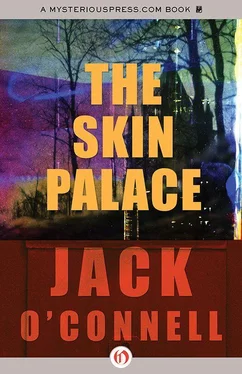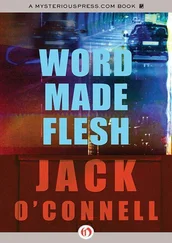“It’s not that. I—”
“I could tell you some things that might help you locate him. After twenty years, a man comes to know some things about his neighbor.”
“What things?” she says.
“Come next door,” he says, extending his arm like some elderly groom. “Come now. I will give you a tour of my shop. Aren’t you the least bit curious? I find most people are.”
“What things do you know about Mr. Derry?” she asks.
“Let us have some tea, Sylvia,” he says, gesturing toward the door with his head. “We can relax. I’ll tell you everything.”
She moves around the counter, all set to walk past him and head home. But she surprises herself by stopping at the door and turning back and saying, “After you.”
“Wonderful,” he says and gives a snap of his wrist to assemble his cane. She’s a little startled by the vigor of his movement. He comes up next to her and again extends his arm and not knowing what else to do, she takes it, as if he were some bizarre and long-lost grandfather, and they step out onto the sidewalk.
“The weather people,” Mr. Quevedo says, “they are predicting a particularly cold winter.”
They step over to the adjoining storefront and he pulls a set of keys from his suitcoat pocket. Sylvia watches his hands tremble a bit as he tries to fit the correct key into the slot. Like Jack Derry’s the front of the building is red brick with two inset plate glass windows on either side of the doorway. There’s no neon above the entrance, however, just a handpainted sign, slightly faded, with calligraphied lettering that reads Brody’s Adult Books on what looks like a steel-plated door. The front windows of the shop have some kind of smoked glaze over them that makes it almost impossible to see inside.
“I hate the winter myself,” Mr. Quevedo says, pushing the door open and stepping aside so she can enter. It’s dark inside until he throws a wall switch and the room fills with an old-fashioned kind of yellowish glow from stencilled globe lamps mounted high up on the walls.
“May I take your coat?” he asks, but she shakes him off.
“No thanks,” she says, folding her arms. “I can only stay a few minutes.”
Somewhere in the rear of the store a phone starts to ring.
“That’s unusual,” he says, seemingly to himself. “Make yourself at home. I’ll be back in just a moment.” He disappears down a tall aisle of bookcases and after a second the ringing stops.
The shop is nothing like Sylvia would have expected. She’s never been in one of these places before, but she’s got to imagine Brody’s is the exception and not the rule. If it weren’t for the sign on the door, she’d mistake it for a cozy, secondhand book den, the kind of place you’d stumble upon in one of those semi-sleepy Berkshire towns. The only thing it shares with Derry’s location. She expected a kind of sleazy, shabby dump, sort of a gritty, stale shack with dirty linoleum on the floor and peeling paint and steaming radiators and lines of these hard-up raincoat perverts drooling over crumpled magazines.
Brody’s is as neat as some tony doctor’s office, but a lot warmer. There are beautiful Persian rugs on the floor and the walls are covered with what look like mahogany bookshelves. There are a few prints hanging on an open wall, all framed in antique gilt. She’s struck immediately by the one she recognizes — Jean Fouquet’s Madonna and Child, a painting that’s always bothered her a little, probably due to all those wooden-faced angels surrounding the mother and infant. Today, it’s like some eerie warning sign of coincidence.
There are two brocade-covered settees facing each other and separated by a low, wide, heavy-looking coffee table covered with oversized art books. It’s only when you start to settle in and look closer that the true nature of the shop becomes recognizable. The porcelain figurines displayed here and there on shelves are locked into various stages of lewd behavior. The leather-bound coffee table books sport titles like Beyond the Kama Sutra and A Manual for Extended Ecstasy. Even the coat rack in the corner seems to have a slightly phallic design to it.
She starts to walk toward a glass cabinet with a sign above it that reads First Editions — Please ask the manager for help, when Mr. Quevedo returns to the front of the store. His white cane is gone and he has no difficulty in making his way to the couch.
“Excuse the interruption,” he says and gestures that she should take a seat opposite him. “A customer calling from Brazil with an order.”
She sits on the edge of the settee. “You have a customer from Brazil?”
“I have several,” he says. “The majority of our business has always been mail order. We send out catalogues quarterly. We tend to service what is called the plush end of the customer base. Cosmopolitan. Educated and urbane. Old family money.”
“I had no idea. I mean, this isn’t what I expected to find in here.”
“You’ve passed by our store before?”
“A’ few times,” she says. “I’m not from this part of the city.”
“You’re a native?” he asks and seems surprised.
“Whole life. I went away to college but that’s it. You’re not from here, are you? I hear an accent.”
A teakettle begins to whistle and he smiles, mouths the words excuse me and moves again to the back of the store. She hears a moment of muffled clatter like dishes clinking together, then the whistle sound dies away and it’s silent in the store and suddenly she starts to think she should get up and leave before the old man comes back.
Instead, she opens one of the art books on the coffee table and finds herself looking at a full-page artist’s rendering of some obscure and acrobatic coitus. The style is clear and detailed, close to photo-real. There’s a man and woman, fully naked, sprawled on a stark white background and depicted from above. And she can’t take her eyes off them until she hears Mr. Quevedo clear his throat and turns to see him standing behind the settee carrying a small silver tray that holds a teapot and two cups.
She closes the book immediately and shifts her position. She’s both embarrassed and nervous, as if her mother had caught her disobeying some strict commandment. But then it occurs to her— the man’s blind, right? He can’t see what I’m doing, can he?
Whatever Mr. Quevedo can or cannot see, he makes no mention of the book. He places the tray down on the table and fills her teacup with a steaming, rose-colored liquid.
“I was born,” he says, picking up the conversation, “in Buenos Aires. A small suburban district called, if you will believe it, Palermo. But I spent a good deal of my formative years traveling the continent. Actually, I’ve resided here in Quinsigamond longer than anywhere else. It took me years to find a city that fit my needs. I have no intention of moving again.”
Sylvia takes a sip of the tea. It has an overly perfumed smell, but it tastes delicious. “And how did you come to live here?”
“That,” he says, “is a long and very tedious story.”
He pours himself a cup, sticks his little finger into the tea, waits a beat, then uncaps the pot and pours his cup back inside. He brings his hand up to his mouth and dabs at his lips with the little finger.
She looks away, takes another sip of her tea. She says, “You mentioned that you might know how I could find Mr. Derry.”
“Possibly,” he says and she can’t help but stare at his eyes. They’re like those cloudy marbles you used to see in the candy store as a kid. They’re like sockets of watery milk. They’re off-putting and they almost make her cringe, but she can’t stop focusing in on them.
Читать дальше











